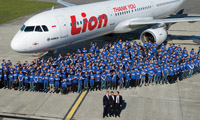News Backgrounder
A step too far?
There were mixed reactions from analysts when Indonesia’s Lion Air announced its record order for 234 Airbus 320s last month. Has the ambitious budget operator bitten off more than it can chew?
April 1st 2013
Indonesia’s rapidly expanding budget carrier, Lion Air, may be secretive about its core financial position – it doesn’t release profit details – but it is far from coy when it comes to grabbing the limelight. Read More »
 |
| Thank you: a clear message of thanks to Lion Air from Airbus and its staff in Toulouse. In the foreground from left are: Jean-Francois Laval, Airbus senior vice-president Asia, Rusdi Kirana, co-founder and CEO of Lion Air and Airbus president and CEO, Fabrice Bregier |
In 2011, it stunned the industry when it signed a purchase agreement with Boeing for 230 B737s, worth around US$22.4 billion at list prices. U.S. president, Barack Obama, witnessed the contract signing.
Last month, Lion outdid itself, this time ordering 234 A320s worth $24 billion, with French president, Francois Hollande, in attendance.
For Airbus it was a record single order in terms of aircraft numbers and value. The question is: what will Lion do with the 464 single-aisle jets arriving in the next decade?
“We will use the aircraft to start up new airline ventures underpinned by strong demand in Asia,” said the airline’s co-founder and chief executive, Rusdi Kirana, responding to the obvious question at the signing ceremony in Paris.
He shrugged aside concerns about Asia’s ability to absorb huge quantities of new aircraft. “People who say that don’t understand the market in Asia,” he said. “These aircraft will be used for two new airlines we plan to have in the Asia-Pacific by 2014. The first six airplanes will be delivered in 2014.”
The concern of some observers is that Lion isn’t the only airline in the region with bumper orders. Competitor AirAsia, currently the region’s leading low-cost carrier (LCC), has 450 single-aisle aircraft on order.
Hundreds more are due to be delivered to other LCCs across the region in the next 10 years, representing a slew of more than 1,000 new jets coming on line.
It is clear Kirana intends to seriously challenge Tony Fernandes’ AirAsia Group in the region’s budget skies. In Paris, he indicated Lion wasn’t finished yet.
It plans an initial public offering (IPO) in 2015 to raise more money. “We will use the money to buy more airplanes,” said the Lion chief, who started his working life as a typewriter salesman.
While 90% of its capacity currently flies within Indonesia, Lion has big international ambitions. Last September, it took a 49% stake in a new Malaysia-based carrier, Malindo Airways, scheduled to begin operations in May.
Later this year, it plans a long-haul budget arm, Batik Air, which will operate with six B737s and, later, five B787 Dreamliners.
Some of the new Airbus aircraft - 109 A320neos, 65 A321neos and 60 A320ceos - will go to Malindo. It is undertstood Kirana has his sights set on a big expansion into China and India. There also have been suggestions Lion is interested in starting an offshoot in Australia, where domestic airlines can be 100% foreign-owned.
Brendan Scobi, analyst with consultant, CAPA, said in a recent report the vast potential of Indonesia’s aviation market, where passenger numbers have been growing at more than 15% annually, and the scope for offshoot carriers, supported the scale of Lion’s orders.
“If you look at the projections for growth in Indonesia, assuming that Lion maintains its current market share and leading position, they are going to need a few hundred more aircraft just to keep that position,” he said.
Not everyone is convinced with this argument. Shukor Yusof, analyst at Standard & Poor’s Equity Research in Singapore, suggested Kirana “may have bitten off more than he can chew”.
Other analysts and industry observers wonder how Lion is going to be able to finance aircraft orders now worth a staggering $46.4 billion.
Kirana and his brother, Kusnan, who operated a travel agency empire and founded Lion in 1999, are ranked the 33rd richest Indonesians with collective wealth of $900 million.
Launched with just one aircraft in 2000, Lion now has a fleet of 92 planes.